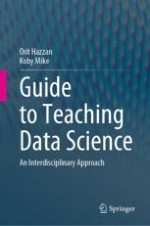2023 | OriginalPaper | Buchkapitel
18. Data Science Teacher Preparation: The “Method for Teaching Data Science” Course
verfasst von : Orit Hazzan, Koby Mike
Erschienen in: Guide to Teaching Data Science
Aktivieren Sie unsere intelligente Suche, um passende Fachinhalte oder Patente zu finden.
Wählen Sie Textabschnitte aus um mit Künstlicher Intelligenz passenden Patente zu finden. powered by
Markieren Sie Textabschnitte, um KI-gestützt weitere passende Inhalte zu finden. powered by
